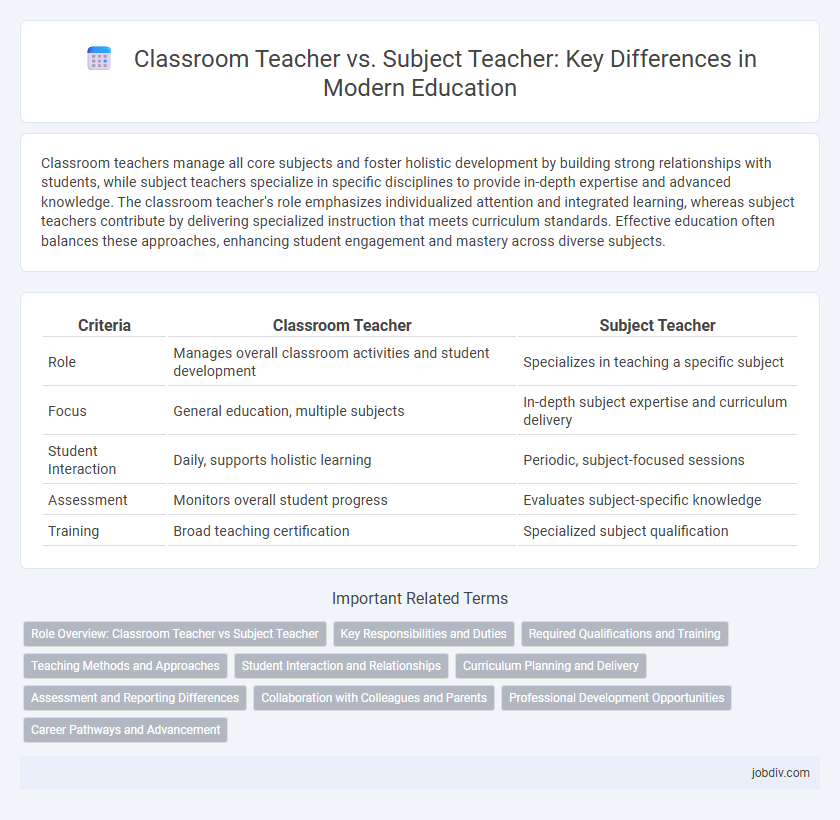Classroom teachers manage all core subjects and foster holistic development by building strong relationships with students, while subject teachers specialize in specific disciplines to provide in-depth expertise and advanced knowledge. The classroom teacher's role emphasizes individualized attention and integrated learning, whereas subject teachers contribute by delivering specialized instruction that meets curriculum standards. Effective education often balances these approaches, enhancing student engagement and mastery across diverse subjects.
Table of Comparison
| Criteria | Classroom Teacher | Subject Teacher |
|---|---|---|
| Role | Manages overall classroom activities and student development | Specializes in teaching a specific subject |
| Focus | General education, multiple subjects | In-depth subject expertise and curriculum delivery |
| Student Interaction | Daily, supports holistic learning | Periodic, subject-focused sessions |
| Assessment | Monitors overall student progress | Evaluates subject-specific knowledge |
| Training | Broad teaching certification | Specialized subject qualification |
Role Overview: Classroom Teacher vs Subject Teacher
Classroom teachers manage the overall learning environment by covering multiple subjects and addressing students' social and emotional needs, ensuring a cohesive educational experience from one day to the next. Subject teachers specialize in a specific academic area, delivering in-depth content knowledge and advanced instructional strategies tailored to their discipline. Both roles are integral to student achievement, with classroom teachers providing continuity and subject teachers offering expertise in their fields.
Key Responsibilities and Duties
Classroom teachers manage overall student development by delivering lessons across multiple subjects, maintaining classroom discipline, and tracking student progress to ensure holistic growth. Subject teachers specialize in specific academic areas, designing detailed curricula, conducting in-depth subject instruction, and assessing students' expertise in their particular discipline. Both roles require collaboration with parents and school staff, but classroom teachers focus on broad student engagement while subject teachers emphasize subject mastery.
Required Qualifications and Training
Classroom teachers typically require a bachelor's degree in education along with state certification or licensure, emphasizing broad pedagogical skills to manage diverse subjects and student needs. Subject teachers often hold specialized degrees in their specific discipline, such as mathematics or science, combined with targeted certification or endorsements to demonstrate subject matter expertise. Both roles generally necessitate continuous professional development and training to stay updated with educational standards, instructional strategies, and technology integration.
Teaching Methods and Approaches
Classroom teachers often employ holistic teaching methods that integrate multiple subjects using diverse activities and collaborative learning to address varied student needs. Subject teachers typically focus on specialized instruction with deep content expertise, utilizing targeted strategies such as lectures, discussions, and subject-specific assessments to enhance mastery. Both approaches aim to optimize student engagement and comprehension by adapting pedagogical techniques to learning objectives and classroom dynamics.
Student Interaction and Relationships
Classroom teachers maintain continuous interaction with students across various subjects, fostering strong, holistic relationships that support overall development. Subject teachers engage students through specialized content, promoting deeper academic focus but with limited daily personal contact. This difference influences the nature of student relationships, with classroom teachers providing broader emotional support and subject teachers offering targeted expertise.
Curriculum Planning and Delivery
Classroom teachers manage comprehensive curriculum planning and delivery across multiple subjects, ensuring cohesive learning experiences aligned with educational standards. Subject teachers specialize in in-depth content expertise, designing targeted lessons that address specific curricular goals and advanced topics within their discipline. Effective collaboration between classroom and subject teachers enhances curriculum coherence and student achievement through tailored instructional strategies.
Assessment and Reporting Differences
Classroom teachers assess student progress holistically, integrating multiple subjects to provide comprehensive evaluations that reflect overall learning development. Subject teachers focus on specialized assessment methods tailored to their discipline, utilizing specific criteria and standards to measure student mastery in particular content areas. Reporting by classroom teachers often emphasizes general academic growth and social skills, while subject teachers provide detailed feedback on subject-specific strengths and weaknesses.
Collaboration with Colleagues and Parents
Classroom teachers facilitate ongoing collaboration with colleagues and parents to support students' holistic development by sharing progress reports, behavioral insights, and learning strategies. Subject teachers concentrate on coordinating with fellow subject specialists to align curriculum content and assessment methods while communicating subject-specific challenges and achievements to parents. Both roles rely on consistent, clear communication to create a cohesive support network that enhances student learning outcomes and engagement.
Professional Development Opportunities
Classroom teachers often engage in broad professional development programs that enhance general pedagogy, classroom management, and student engagement strategies applicable across multiple subjects. Subject teachers benefit from specialized training and workshops that deepen expertise in their specific discipline, fostering advanced content knowledge and innovative teaching methods. Both roles have access to collaborative learning communities and mentorship opportunities, supporting continuous improvement tailored to their teaching contexts.
Career Pathways and Advancement
Classroom teachers typically manage multiple subjects for a single group of students, offering opportunities to develop broad instructional and classroom management skills that pave the way for roles like grade-level coordinator or instructional coach. Subject teachers specialize in one discipline, which allows deeper expertise and can lead to career advancement in curriculum development, departmental leadership, or specialist roles such as academic advisor. Both pathways involve continuous professional development, with subject teachers often engaging in advanced certifications related to their subject area to enhance career prospects.
Classroom Teacher vs Subject Teacher Infographic

 jobdiv.com
jobdiv.com